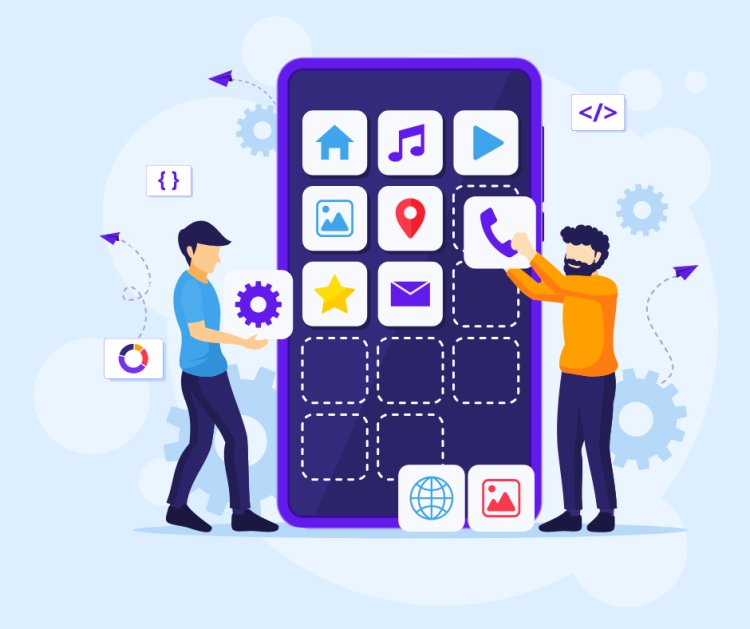Custom Software Development for Mobile Apps: Trends and Best Practices
mobile apps have become indispensable for businesses across all industries. Custom software development for mobile apps offers unique advantages
Share this Post to earn Money ( Upto ₹100 per 1000 Views )

In today's fast-paced digital landscape, mobile apps have become indispensable for businesses across all industries. Custom software development for mobile apps offers unique advantages, enabling businesses to tailor solutions specifically to their needs. This blog explores the latest trends and best practices in custom software development for mobile apps, providing valuable insights for businesses and developers alike.
Trends in Custom Software Development for Mobile Apps
1. AI and Machine Learning Integration
Artificial Intelligence (AI) and Machine Learning (ML) are revolutionizing mobile app development. These technologies enable apps to provide personalized experiences, predictive analytics, and advanced automation. For instance, AI-powered chatbots can enhance customer service, while ML algorithms can analyze user behavior to offer personalized content.
2. Internet of Things (IoT)
The integration of IoT in mobile apps is expanding, connecting devices and systems to create seamless and interactive experiences. From smart home applications to industrial IoT solutions, the ability to control and monitor devices through mobile apps is becoming increasingly common. IoT-enabled apps can gather and analyze data in real-time, enhancing efficiency and user engagement.
3. 5G Technology
The rollout of 5G technology is set to transform mobile app development. With significantly faster data speeds and lower latency, 5G enables the creation of more complex and data-intensive applications. This technology opens up possibilities for enhanced augmented reality (AR), virtual reality (VR), and real-time multiplayer gaming experiences.
4. Augmented Reality (AR) and Virtual Reality (VR)
AR and VR are gaining traction in various sectors, including gaming, healthcare, education, and retail. Custom mobile apps incorporating AR and VR can provide immersive experiences, such as virtual try-ons in retail, interactive learning modules in education, and advanced simulations in healthcare.
5. Blockchain Technology
Blockchain is being increasingly used in mobile app development to enhance security, transparency, and traceability. From secure payment gateways to decentralized apps (dApps), blockchain technology offers robust solutions for data integrity and security, making it particularly relevant for finance, healthcare, and supply chain industries.
Best Practices in Custom Software Development for Mobile Apps
1. Define Clear Objectives
Before starting the development process, it's crucial to define clear objectives for the mobile app. Understand the problem you're solving, the target audience, and the key features needed. This clarity will guide the development process and ensure the final product meets the intended goals.
2. Choose the Right Technology Stack
Selecting the appropriate technology stack is critical for the success of a custom mobile app. Consider factors like platform compatibility (iOS, Android, or both), scalability, security, and performance. Consulting with an experienced app development agency can help in making informed decisions regarding the technology stack.
3. Focus on User Experience (UX)
A seamless and intuitive user experience is paramount for the success of any mobile app. Invest in UX research and design to create a user-friendly interface. Conduct usability testing to gather feedback and make necessary adjustments. A positive user experience can significantly enhance user retention and satisfaction.
4. Implement Agile Methodology
Using Agile methodology in mobile app development allows for flexibility and iterative progress. This approach enables continuous testing, feedback, and improvements throughout the development cycle. Agile practices ensure that the app evolves in response to user needs and market trends, reducing the risk of costly post-launch changes.
5. Prioritize Security
Security is a top priority in custom mobile app development. Implement robust security measures, such as encryption, secure APIs, and regular security audits. Ensure compliance with relevant regulations and standards, such as GDPR for data protection. A secure app builds trust with users and protects sensitive information from breaches.
6. Optimize Performance
Performance optimization is crucial for providing a smooth user experience. Focus on reducing load times, optimizing code, and minimizing battery consumption. Regularly monitor the app's performance and address any issues promptly. A high-performing app enhances user satisfaction and reduces the likelihood of uninstalls.
7. Plan for Scalability
Design the app with scalability in mind to accommodate future growth. Ensure the architecture can handle increased traffic, data, and functionality without compromising performance. Scalability planning helps in managing growth efficiently and avoiding potential technical bottlenecks.
8. Regular Updates and Maintenance
Post-launch, continuous updates and maintenance are essential to keep the app relevant and functional. Regularly update the app to fix bugs, improve performance, and introduce new features. Monitor user feedback and analytics to identify areas for improvement and respond to user needs effectively.
Conclusion
Custom software development for mobile apps is an evolving field, driven by technological advancements and changing user expectations. By staying abreast of the latest trends and adhering to best practices, businesses can create robust, user-centric mobile applications that offer competitive advantages. Partnering with a reputable app development agency can further enhance the development process, ensuring that the final product aligns with business goals and user needs.
Investing in custom mobile app development is a strategic move that can drive growth, improve customer engagement, and streamline operations. As technology continues to advance, the possibilities for innovative and impactful mobile applications are boundless. Embrace these trends and best practices to stay ahead in the dynamic world of mobile app development.

 emmawatson11
emmawatson11 





![CelluCare Cost - [ CUSTOMERS ADVICES 2024 ] A Comprehensive Guide to CelluCare Reviews!](https://blog.rackons.in/uploads/images/202407/image_380x226_6688dff060be6.jpg)
